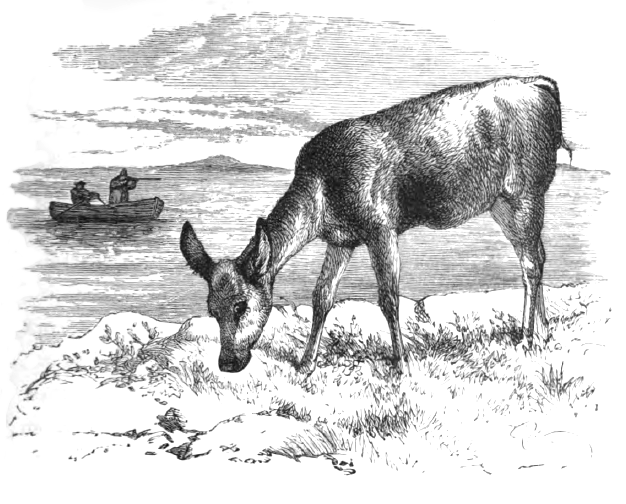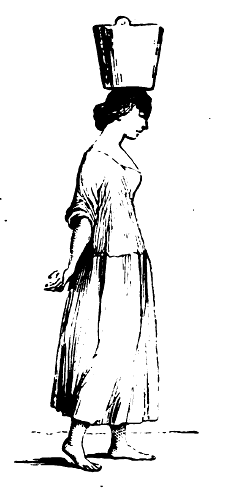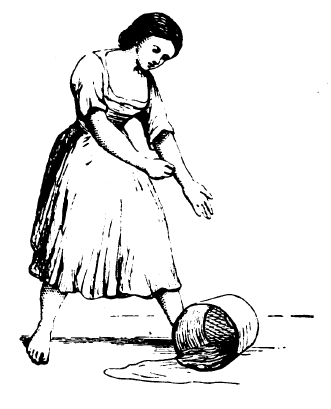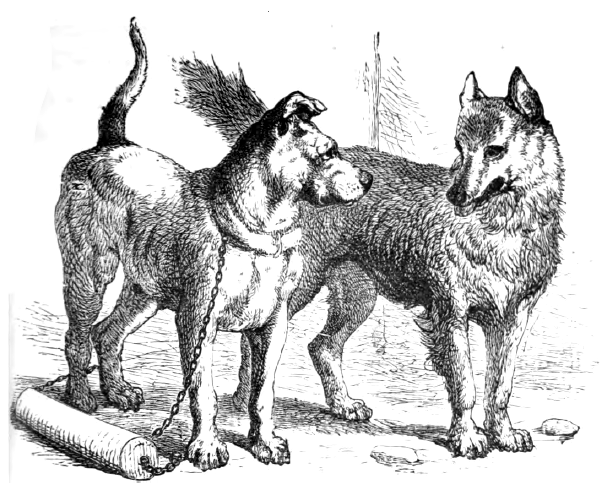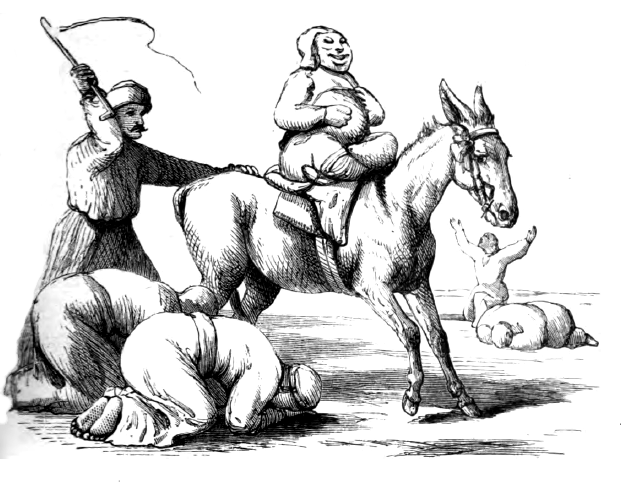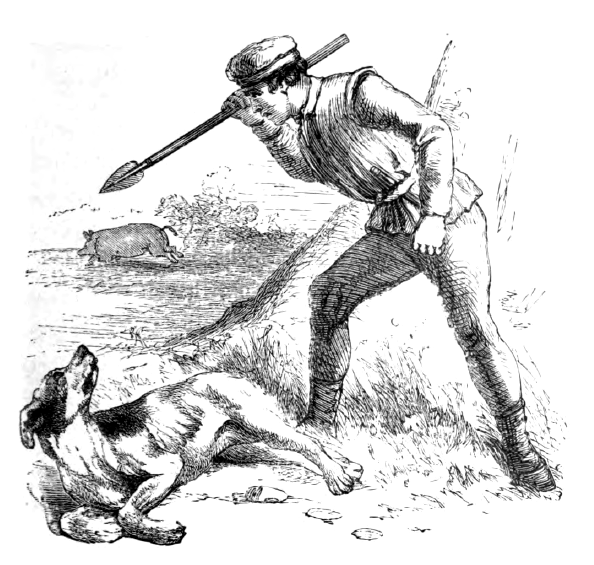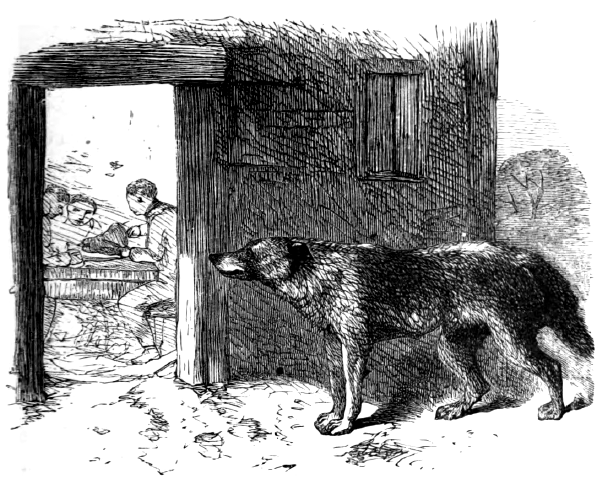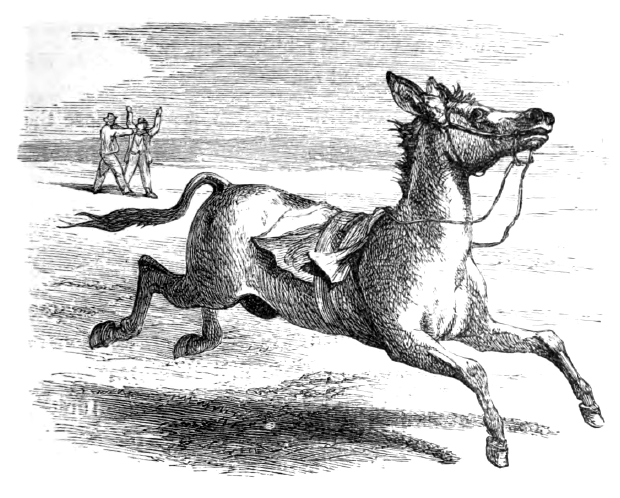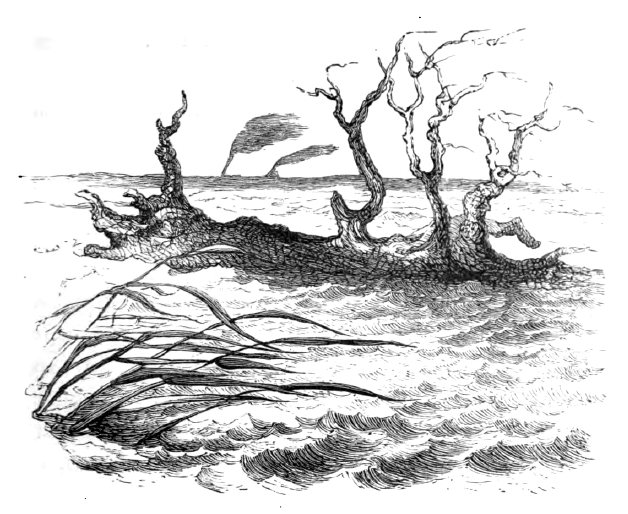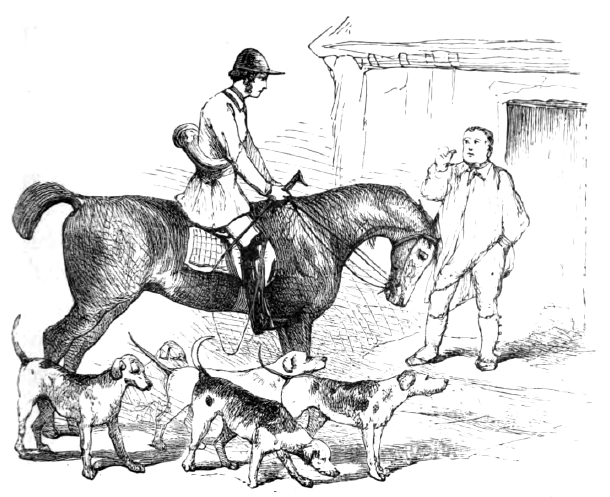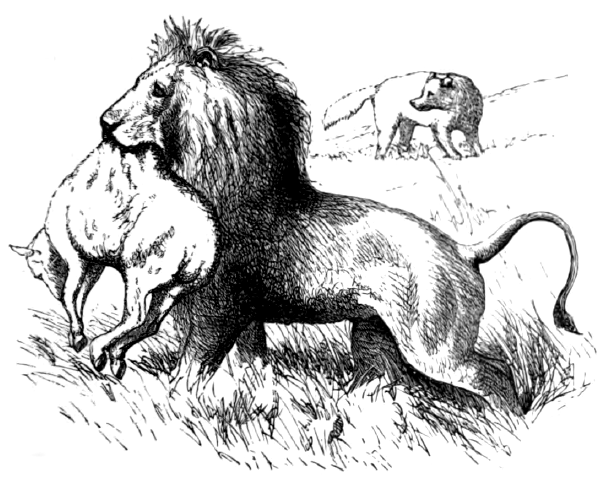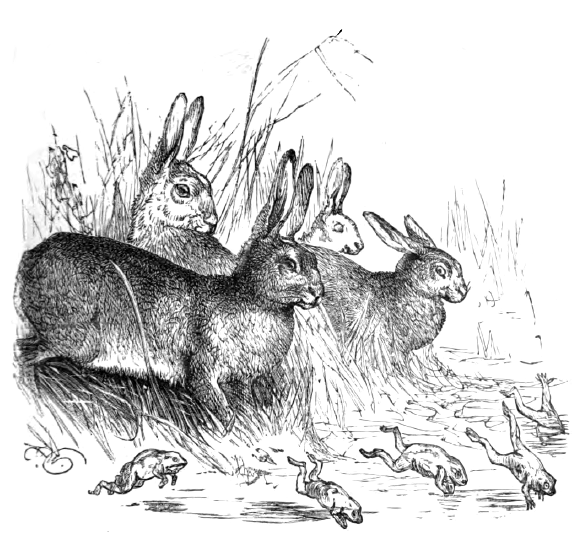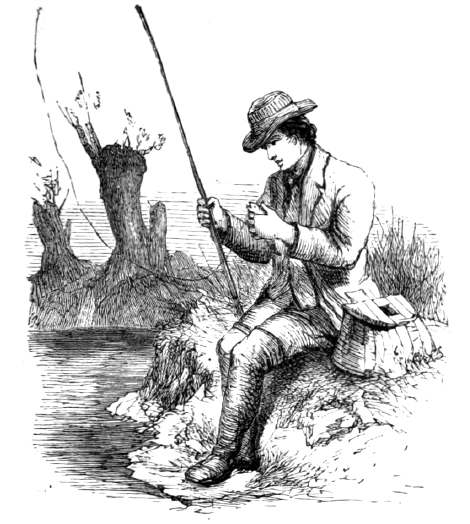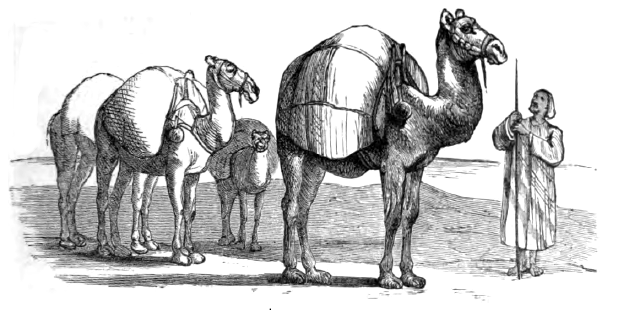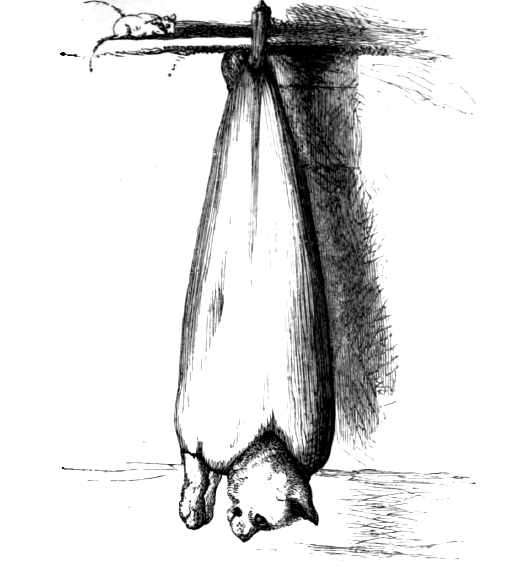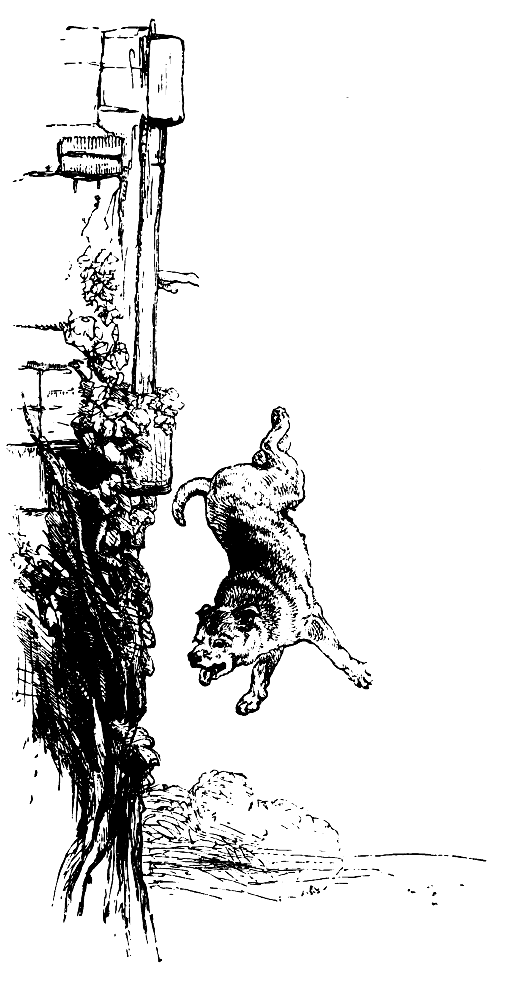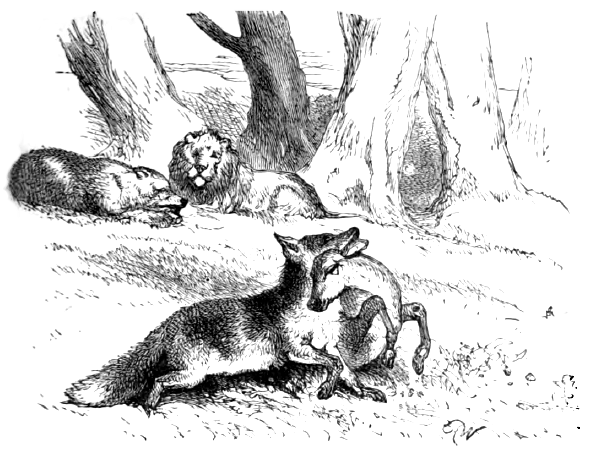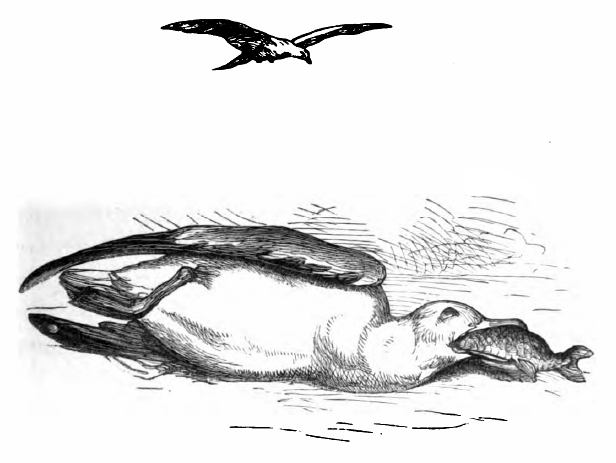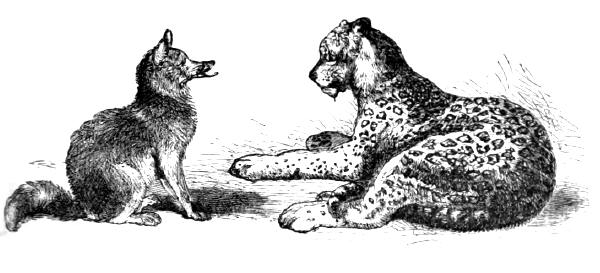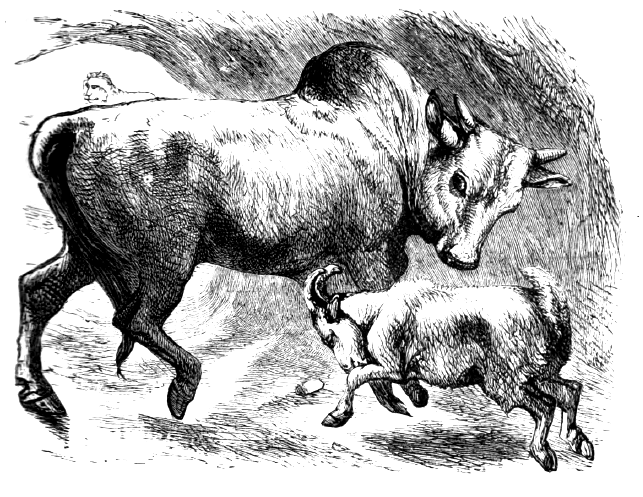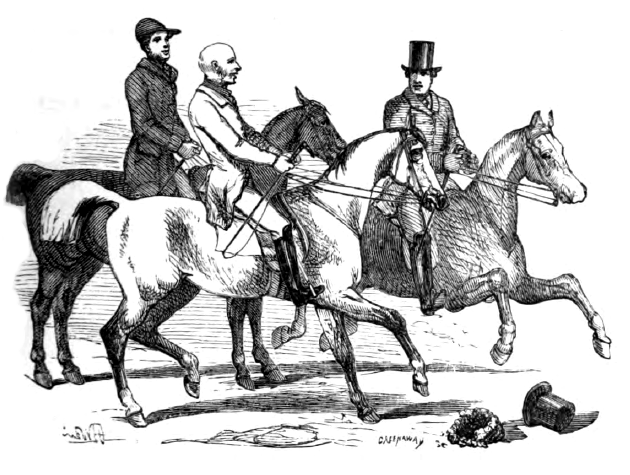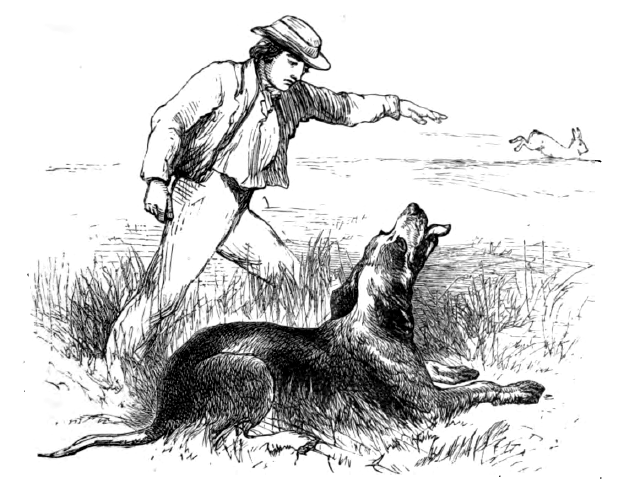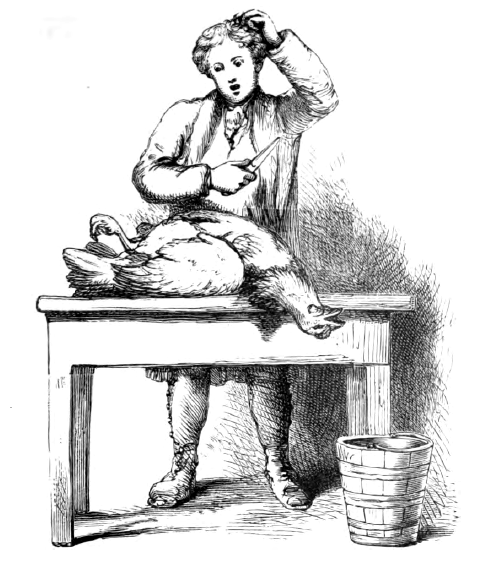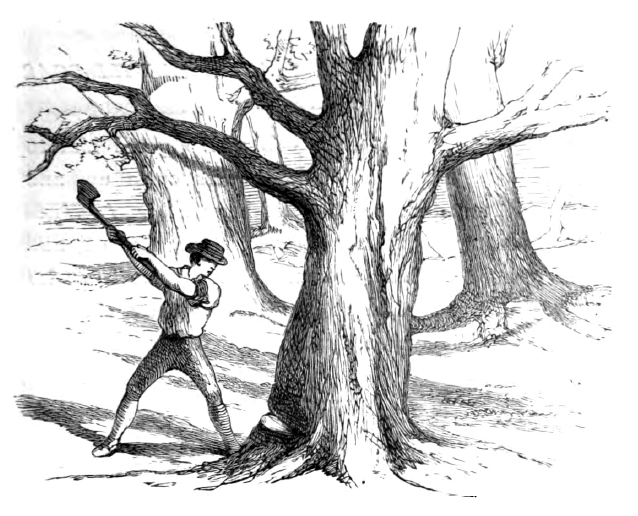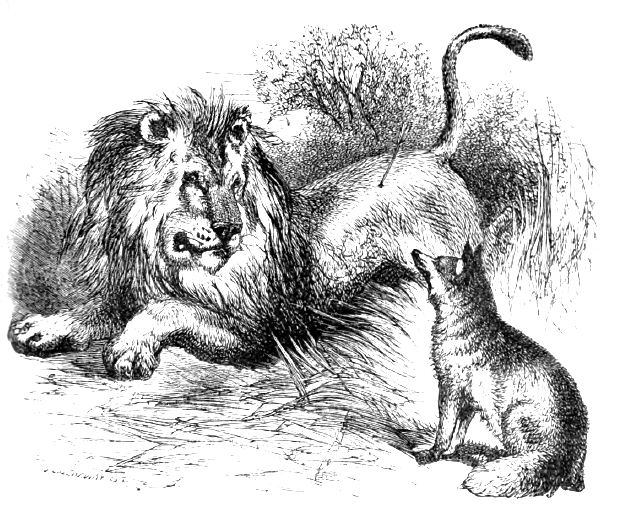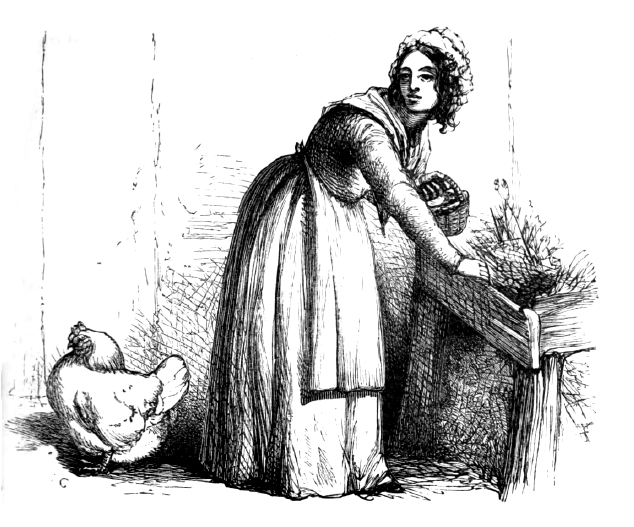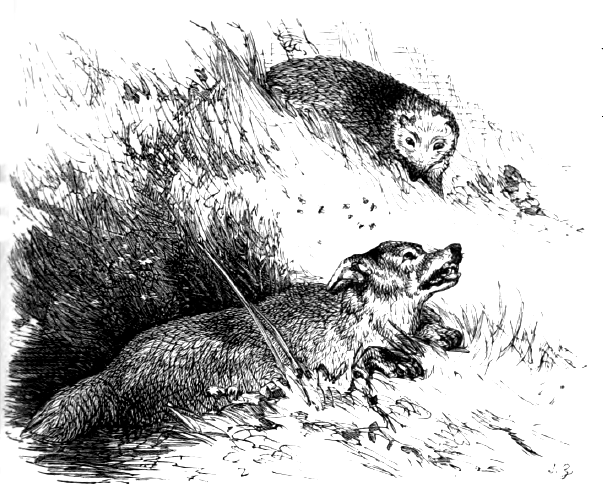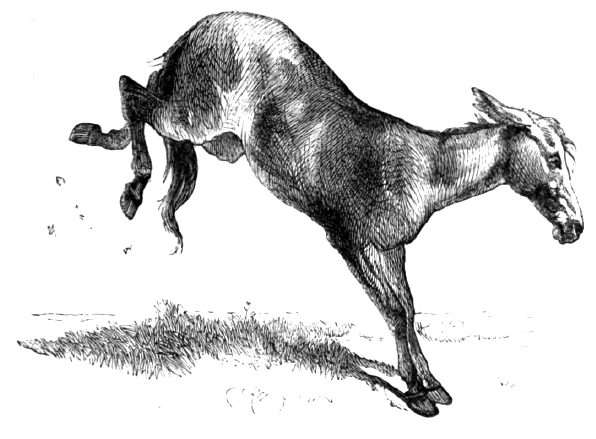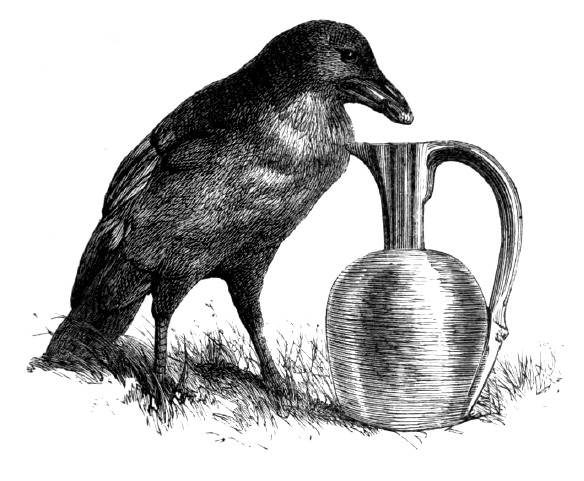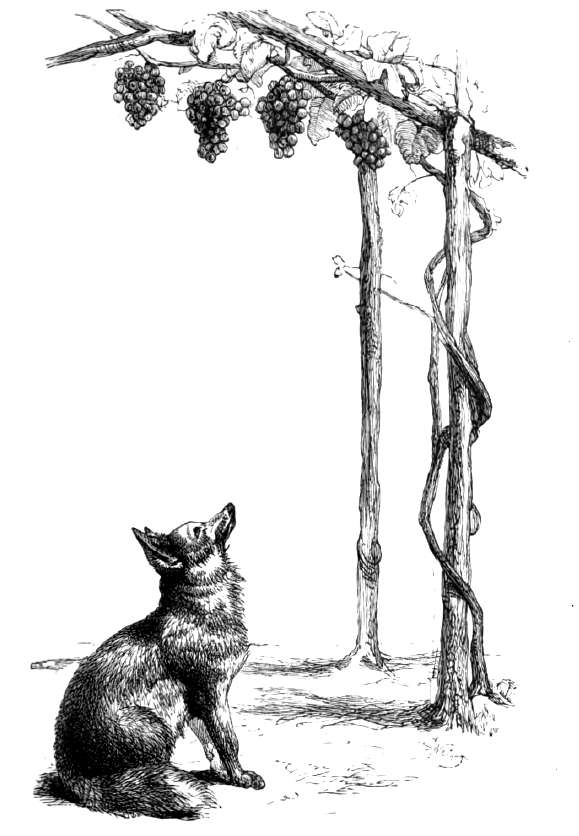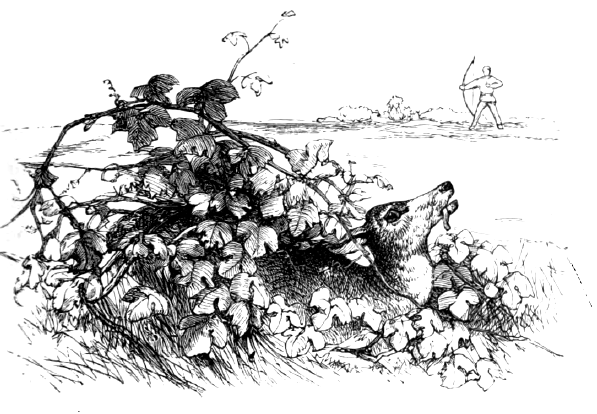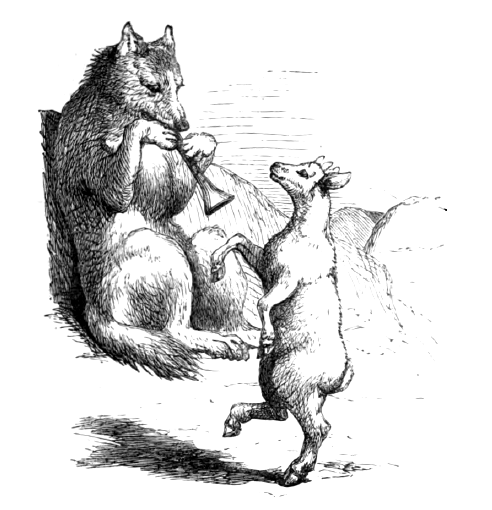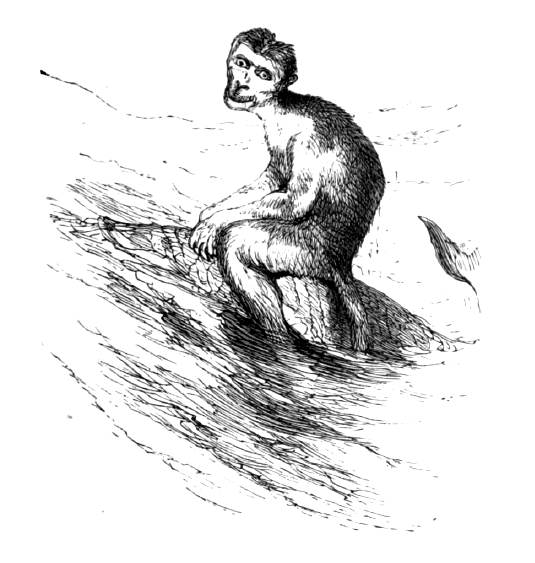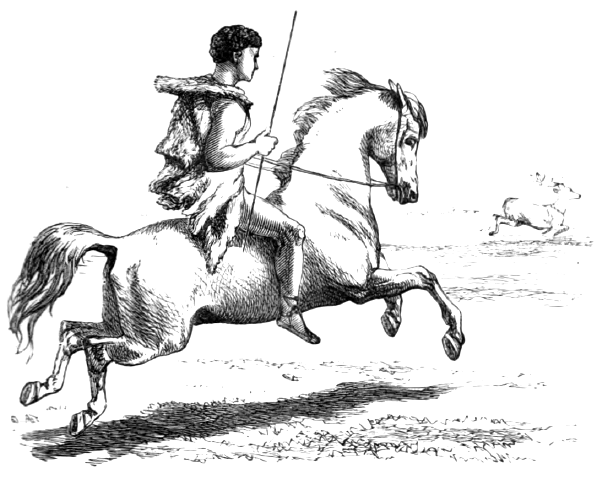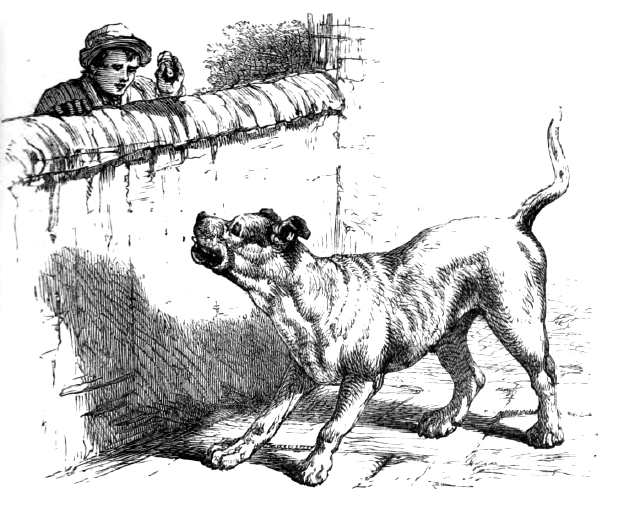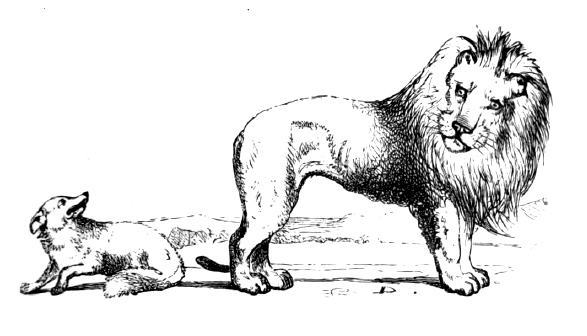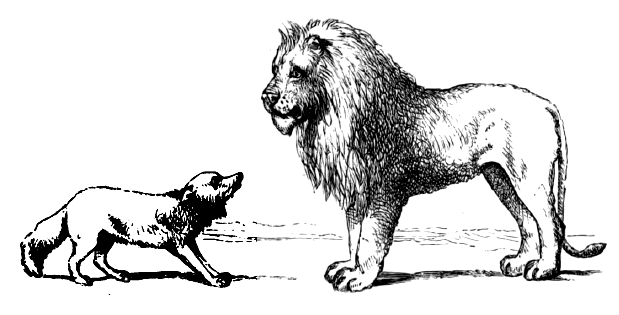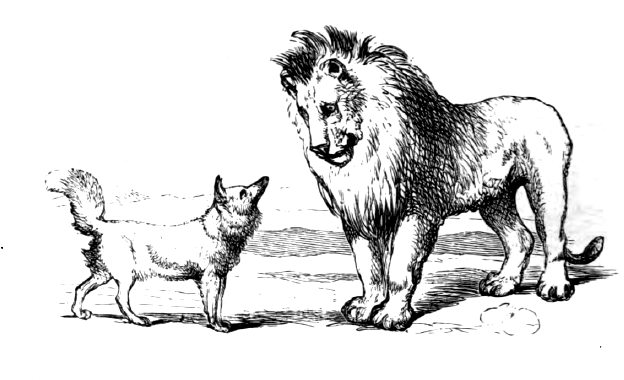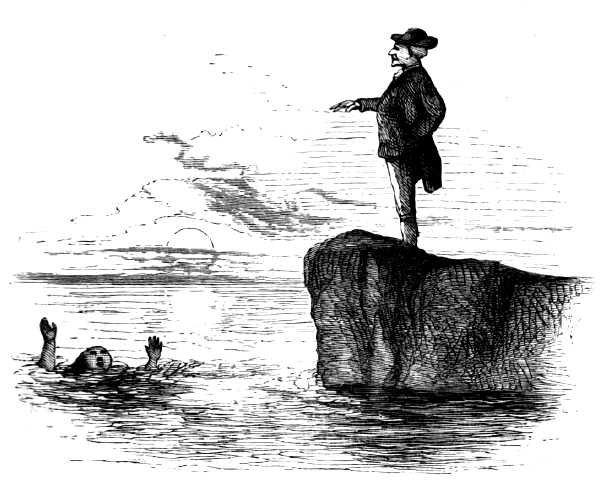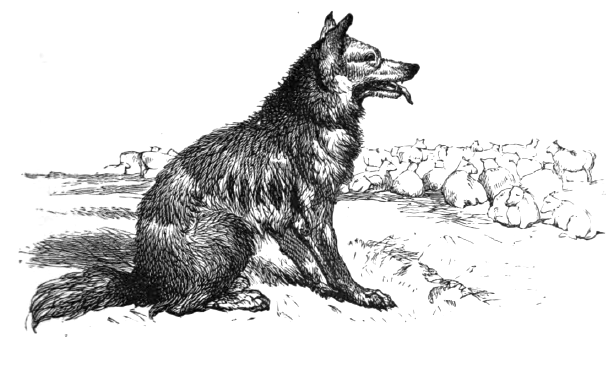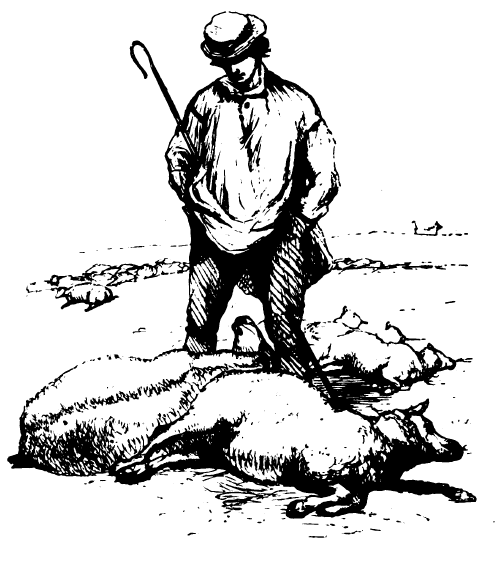| Web
and Book design,
Copyright, Kellscraft Studio 1999-2016 (Return to Web Text-ures) |
 (HOME)
|
|
A Doe, blind of
an eye, was accustomed to graze as near to the edge of
the cliff as she possibly could, in the hope of securing her greater
safety.
She turned her sound eye towards the land, that she might get the
earliest
tidings of the approach of hunter or hound, and her injured eye towards
the
sea, from whence she entertained no anticipation of danger. Some
boatmen
sailing by, saw her, and taking a successful aim, mortally wounded her.
Yielding up her breath, she gasped forth this lament: "O wretched
creature
that I am! to take such precaution against the land, and after all to
find this
sea-shore, to which I had come for safety, so much more perilous." THE SHEPHERD AND THE SEA A Shepherd,
keeping watch over his sheep near the shore, saw the Sea
very calm and smooth, and longed to make a voyage with a view to
traffic. He
sold all his flock, and invested it in a cargo of dates and set sail.
But a
very great tempest coming on, and the ship being in danger of sinking,
he threw
all his merchandise overboard, and hardly escaped with his life in the
empty
ship. Not long afterwards, on some one passing by, and observing the
unruffled
calm of the sea, he interrupted him and said, "Belike it is again in
want
of dates, and therefore looks quiet." THE ASS, THE COCK, AND THE LION. An Ass and a
Cock were in a straw-yard together, when a Lion, desperate
from hunger, approached the spot. He was about to spring upon the Ass,
when the
Cock (to the sound of whose voice the Lion, it is said, has a singular
aversion) crowed loudly, and the Lion fled away as fast as he could.
The Ass
observing his trepidation at the mere crowing of a Cock, summoned
courage to
attack him, and galloped after him for that purpose. He had run no long
distance, when the Lion turning about, seized him and tore him to
pieces. False
confidence often
leads into danger.
A FARMER'S
daughter was carrying her pail of milk from the field to the
farm-house, when she fell amusing. "The money for which this milk will
be
sold, will buy at least three hundred eggs. The eggs, allowing for all
mishaps,
will produce two hundred and fifty chickens. The chickens will become
ready for
the market when poultry will fetch the highest price; so that by the
end of the
year I shall have money enough from the perquisites that will fall to
my share,
to buy a new gown. In this dress I will go to the Christmas junketings,
when
all the young fellows will propose to me, but I will toss my head, and
refuse
them every one." At this moment she tossed her head in unison with her
thoughts, when down fell the Milk-pail to the ground, and all her
imaginary
schemes perished in a moment.
THE MICE IN COUNCIL. The Mice
summoned a council to decide how they might best devise means
for obtaining notice of the approach of their great enemy the Cat.
Among the
many plans devised, the one that found most favour was the proposal to
tie a
bell to the neck of the Cat, that the Mice being warned by the sound of
the
tinkling might run away and hide themselves in their holes at his
approach. But
when the Mice further debated who among them should thus "bell the
Cat," there was no one found to do it.
A WOLF, meeting
with a big well-fed Mastiff having a wooden collar about
his neck, inquired of him who it was that fed him so well, and yet
compelled
him to drag that heavy log about wherever he went. "The master," he
replied. Then said the Wolf: "May no friend of mine ever be in such a
plight; for the weight of this chain is enough to spoil the appetite." THE
RIVERS AND
THE SEA. The Rivers
joined together to complain to the Sea, saying, "Why
is it that when we flow into your tides so potable and sweet, you work
in us
such a change, and make us salt and unfit to drink?" The Sea,
perceiving
that they intended to throw the blame on him, said, "Pray cease to flow
into me, and then you will not be made briny." Some find
fault
with
those things by which they are chiefly benefited. THE WILD BOAR AND THE FOX. A WlLD BOAR stood
under a tree, and rubbed his tusks against the trunk. A Fox
passing by, asked him why he thus sharpened his teeth when there was no
danger
threatening from either huntsman or hound. He replied, "I do it
advisedly;
for it would never do to have to sharpen my weapons just at the time I
ought to
be using them." To be well
prepared for
war is the best guarantee of peace. THE THREE TRADESMEN. A GREAT city
was besieged, and its inhabitants were called together to
consider the best means of protecting it from the enemy. A Bricklayer
present
earnestly recommended bricks, as affording the best materials for an
effectual
resistance. A Carpenter with equal energy proposed timber, as providing
a
preferable method of defence. Upon which a Currier stood up, and said,
"Sirs, I differ from you altogether: there is no material for
resistance
equal to a covering of hides; and nothing so good as leather." Every man
for
himself.
An Ass once
carried through the streets of a city a famous wooden Image,
to be placed in one of its Temples. The crowd as he passed along made
lowly
prostration before the Image. The Ass, thinking that they bowed their
heads in
token of respect for himself, bristled up with pride and gave himself
airs, and
refused to move another step. The driver seeing him thus stop, laid his
whip
lustily about his shoulders, and said, "O you perverse dull-head! it is
not yet come to this, that men pay worship to an Ass." They are
not
wise who
take to themselves the credit due to others. THE TWO TRAVELLERS AND THE AXE. Two men were
journeying together in each other's company. One of them
picked up an axe that lay upon the path, and said, "I have found an
axe." "Nay, my friend," replied the other, "do not say 'I,'
but 'We' have found an axe." They had not gone far before they saw the
owner of the axe pursuing them, when he who had picked up the axe said,
"We
are undone." "Nay," replied the other, "keep to your first
mode of speech, my friend; what you thought right then, think right
now. Say
'I,' not 'We' are undone." He who
shares
the
danger ought to share the prize. THE OLD LION. A LlON, worn
out with years, and powerless from disease, lay on the
ground at the point of death. A Boar rushed upon him, and avenged with
a stroke
of his tusks a long-remembered injury. Shortly afterwards the Bull with
his
horns gored him as if he were an enemy. When the Ass saw that the huge
beast
could be assailed with impunity, he let drive at his forehead with his
heels.
The expiring Lion said, "I have reluctantly brooked the insults of the
brave, but to be compelled to endure contumely from thee, a disgrace to
Nature,
is indeed to die a double death."
A HOUND, who in
the days of his youth and strength had never yielded to
any beast of the forest, encountered in his old age a boar in the
chase. He
seized him boldly by the ear, but could not retain his hold because of
the
decay of his teeth, so that the boar escaped. His master, quickly
coming up,
was very much disappointed, and fiercely abused the dog. The Hound
looked up,
and said, "It was not my fault, master; my spirit was as good as ever,
but
I could not help mine infirmities. I rather deserve to be praised for
what I
have been, than to be blamed for what I am" THE BEE AND JUPITER. A BEE from
Mount Hymettus, the queen of the hive, ascended to Olympus,
to present to Jupiter some honey fresh from her combs. Jupiter,
delighted with
the offering of honey, promised to give whatever she should ask. She
therefore
besought him, saying, "Give me, I pray thee, a sting, that if any
mortal
shall approach to take my honey, I may kill him." Jupiter was much
displeased, for he loved much the race of man; but could not refuse the
request
on account of his promise. He thus answered the Bee: "You shall have
your
request; but it will be at the peril of your own life. For if you use
your
sting, it shall remain in the wound you make, and then you will die
from the
loss of it." Evil
wishes,
like
chickens, come home to roost. THE MASTER AND HIS DOGS. A CERTAIN man,
detained by a storm in his country house, first of all
killed his sheep, and then his goats, for the maintenance of his
household. The
storm still continuing, he was obliged to slaughter his yoke oxen for
food. On
seeing this, his Dogs took counsel together, and said, "It is time for
us
to be off: for if the master spare not his oxen, who work for his gain,
how can
we expect him to spare us? " He is not
to be
trusted
as a friend who illtreats his own family.
A WOLF passing
by, saw some Shepherds in a hut eating for their dinner a
haunch of mutton. Approaching them, he said, " What a clamour you would
raise, if I were to do as you are doing!" THE SEASIDE TRAVELLERS. Some
travellers, journeying along the sea-shore, climbed to the summit
of a tall cliff, and from thence looking over the sea, saw in the
distance what
they thought was a large ship, and waited in the hope of seeing it
enter the
harbour. But as the object on which they looked was driven by the wind
nearer
to the shore, they found that it could at the most be a small boat, and
not a
ship. When however it reached the beach, they discovered that it was
only a
large fagot of sticks, and one of them said to his companions, "We have
waited for no purpose, for after all there is nothing to see but a
fagot." Our mere
anticipations
of life outrun its realities. THE BRAZIER AND HIS DOG. A BRAZIER had a
little Dog, which was a great favourite with his master,
and his constant companion. While he hammered away at his metals the
Dog slept;
but when, on the other hand, he went to dinner, and began to eat, the
Dog woke
up, and wagged his tail, as if he would ask for a share of his meal.
His master
one day, pretending to be angry, and shaking his stick at him, said,
"You
wretched little sluggard! what shall I do to you? While I am hammering
on the
anvil, you sleep on the mat; and when I begin to eat after my toil, you
wake
up, and wag your tail for food. Do you not know that labour is the
source of
every blessing, and that none but those who work are entitled to eat?"
A TRAVELLER
hired an Ass to convey him to a distant place. The day being
intensely hot, and the sun shining in its strength, the traveller
stopped to
rest, and sought shelter from the heat under the Shadow of the Ass. As
this
afforded only protection for one, and as the traveller and the owner of
the Ass
both claimed it, a violent dispute arose between them as to which of
them had
the right to it. The owner maintained that he had let the Ass only, and
not his
Shadow. The traveller asserted that he had, with the hire of the Ass,
hired his
Shadow also. His quarrel
proceeded from words to blows, and while the men fought the Ass
galloped off. In
quarrelling
about
the shadow we often lose the substance. THE ASS AND HIS MASTERS. An Ass
belonging to a herb-seller, who gave him too little food and too
much work, made a petition to Jupiter that he would release him from
his
present service, and provide him with another master. Jupiter, after
warning
him that he would repent his request, caused him to be sold to a
tile-maker.
Shortly afterwards, finding that he had heavier loads to carry, and
harder work
in the brick-field, he petitioned for another change of master.
Jupiter,
telling him that it should be the last time that he could grant his
request,
ordained that he should be sold to a tanner. The Ass finding that he
had fallen
into worse hands, and noting his master's occupation, said, groaning:
"It
would have been better for me to have been either starved by the one,
or to
have been overworked by the other of my former masters, than to have
been
bought by my present owner, who will even after I am dead tan my hide,
and make
me useful to him."
A VERY large
Oak was uprooted by the wind, and thrown across a stream.
It fell among some Reeds, which it thus addressed: "I wonder how you,
who
are so light and weak, are not entirely crushed by these strong winds."
They replied, "You fight and contend with the wind, and consequently
you
are destroyed; while we on the contrary bend before the least breath of
air,
and therefore remain unbroken, and escape." Stoop to
conquer. THE LION IN A FARM-YARD. A LlON entered
a farm-yard. The farmer, wishing to catch him, shut the
gate. The Lion, when he found that he could not escape, flew upon the
sheep, and
killed them, and then attacked the oxen. The farmer, beginning to be
alarmed
for his own safety, opened the gate, when the Lion got off as fast as
he could.
On his departure the farmer grievously lamented the destruction of his
sheep
and oxen; when his wife, who had been a spectator of all that took
place, said,
"On my word, you are rightly served; for how could you for a moment
think
of shutting up a Lion along with you in the farm-yard, when you know
that you
shake in your shoes if you only hear his roar at ever so great a
distance?" MERCURY AND THE SCULPTOR. MERCURY once
determined to learn in what esteem he was held among
mortals. For this purpose he assumed the character of a man, and
visited in
this disguise a Sculptor's studio. Having looked at various statues, he
demanded the price of two figures of Jupiter and of Juno. When the sum
at which
they were valued was named, he pointed to a figure of himself, saying
to the
Sculptor, "You will certainly want much more tor this, as it is the
statue
of the Messenger of the Gods, and the author of all your gain." The
Sculptor replied, "Well, if you will buy these, I'll fling you that
into
the bargain."
A Fox running
before the hounds, came across a Wood-cutter felling an oak,
and besought him to show him a safe hiding-place. The Wood-cutter
advised him
to take shelter in his own hut. The Fox crept in, and hid himself in a
corner.
The huntsman came up, with his hounds, in a few minutes, and inquired
of the
Wood-cutter if he had seen the Fox. He declared that he had not seen
him, and
yet pointed, all the time he was speaking, to the hut where the Fox lay
hid.
The huntsman took no notice of the signs, but, believing his word,
hastened
forward in the chase. As soon as they were well away, the Fox departed
without
taking any notice of the Wood-cutter: whereon he called to him, and
reproached
him, saying, "You ungrateful fellow, you owe your life to me, and yet
you
leave me without a word of thanks." The Fox replied, "Indeed, I should
have thanked you fervently, if your deeds had been as good as your
words, and
if your hands had not been traitors to your speech." THE BIRDCATCHER, THE PARTRIDGE, AND THE COCK. A BlRDCATCHER
was about to sit down to a dinner of herbs, when a friend
unexpectedly came in. The birdtrap was quite empty, as he had caught
nothing.
He proceeded to kill a pied Partridge, which he had tamed for a decoy.
He
entreated thus earnestly for his life: "What would you do without me
when
next you spread your nets? Who would chirp you to sleep, or call for
you the
covey of answering birds?" The Birdcatcher spared his life, and
determined
to pick out a fine young Cock just attaining to his comb. He thus
expostulated
in piteous tones from his perch: "If you kill me, who will announce to
you
the appearance of the dawn? Who will wake you to your daily tasks? or
tell you
when it is time to visit the bird-trap in the morning?" He replied,
"What you say is true. You are a capital bird at telling the time of
day.
But I and the friend who has come in must have our dinners." Necessity
knows
no law.
A WOLF having
stolen a lamb from a fold, was carrying him off to his
lair. A Lion met him in the path, and, seizing the lamb, took it from
him. The
Wolf, standing at a safe distance, exclaimed, "You have unrighteously
taken that which was mine from me." The Lion jeeringly replied, "It
was righteously yours, eh? the gift of a friend?" THE ANT AND THE DOVE. An Ant went to
the bank of a river to quench its thirst, and, being
carried away by the rush of the stream, was on the point of being
drowned. A
Dove, sitting
on a tree overhanging the water, plucked a leaf, and let it fall
into the stream close to her. The Ant, climbing on to it, floated in
safety to
the bank. Shortly afterwards a birdcatcher came and stood under the
tree, and
laid his lime-twigs for the Dove, which sat in the branches. The Ant,
perceiving his design, stung him in the foot. He suddenly threw down
the twigs,
and thereupon made the Dove take wing. The
grateful
heart will
always find opportunities to show its gratitude. THE MONKEY AND THE FISHERMEN. A Monkey
perched upon a lofty tree saw some Fishermen casting their nets
into a river, and narrowly watched their proceedings. The Fishermen
after a
while gave over fishing, and, on going home to dinner, left their nets
upon the
bank. The Monkey, who is the most imitative of animals, descended from
the
tree-top, and endeavoured to do as they had done. Having handled the
net, he
threw it into the river, but became entangled in the meshes. When
drowning, he
said to himself, "I am rightly served; for what business had I who had
never handled a net to try and catch fish?"
The Hares,
oppressed with a sense of their own exceeding timidity, and
weary of the perpetual alarm to which they were exposed, with one
accord
determined to put an end to themselves and their troubles, by jumping
from a
lofty precipice into a deep lake below. As they scampered off in a very
numerous body to carry out their resolve, the Frogs lying on the banks
of the
lake heard the noise of their feet, and rushed helter-skelter to the
deep water
for safety. On seeing the rapid disappearance of the Frogs, one of the
Hares
cried out to his companions: "Stay, my friends, do not do as you
intended;
for you now see that other creatures who yet live are more timorous
than
ourselves." THE SWAN AND THE GOOSE. A CERTAIN rich
man bought in the market a Goose and a Swan. He fed the
one for his table, and kept the other for the sake of its song. When
the time
came for killing the Goose, the cook went to take him at night, when it
was
dark, and he was not able to distinguish one bird from the other, and
he caught
the Swan instead of the Goose. The Swan, threatened with death, burst
forth
into song, and thus made himself known by his voice, and preserved his
life by
his melody. A word in
season is
most precious. THE DOE AND THE LION. A DOE hard
pressed by hunters entered a cave for shelter which belonged
to a Lion. The Lion concealed himself on seeing her approach; but, when
she was
safe within the cave, sprang upon her, and tore her to pieces. "Woe is
me," exclaimed the Doe, "who have escaped from man, only to throw
myself into the mouth of a wild beast! " In
avoiding one
evil
care must be taken not to fall into another.
A FISHERMAN who
lived on the produce of his nets, one day caught a
single small fish as the result of his day's labour. The fish, panting
convulsively, thus entreated for his life: "O Sir, what good can I be
to
you, and how little ami worth? I am not yet come to my full size. Pray
spare my
life, and put me back into the sea. I shall soon become a large fish,
fit for
the tables of the rich; and then you can catch me again, and make a
handsome
profit of me." The fisherman replied, "I should indeed be a very
simple fellow, if, for the chance of a greater uncertain profit, I were
to
forego my present certain gain." THE HUNTER AND WOODMAN. A HUNTER, not
very bold, was searching for the tracks of a Lion. He
asked a man felling oaks in the forest if he had seen any marks of his
footsteps, or if he knew where his lair was. "I will," he said,
"at once show you the Lion himself." The Hunter, turning very pale,
and chattering with his teeth from fear, replied, "No,
thank you. I did not ask that; it is his track only I am in search of,
not the
Lion himself." The hero
is
brave in
deeds as well as words. THE SWOLLEN FOX. A Fox, very
much famished, seeing some bread and meat left by shepherds
in the hollow of an oak, crept into the hole and made a hearty meal.
When he
finished, he was so full that he was not able to get out, and began to
groan
and lament very sadly. Another Fox passing by, heard his cries, and
coming up,
inquired the cause of his complaining. On learning what had happened,
he said
to him, "Ah, you will have to remain there, my friend, until you become
such as you were when you crept in, and then you will easily get out."
An Arab
Camel-driver having completed the lading of his Camel, asked him
which he would like best, to go up hill or down hill. The poor beast
replied,
not without a touch of reason: "Why do you ask me? Is it that the level
way through the desert is closed?" THE MILLER, HIS SON, AND THEIR ASS. A MlLLER and
his son were driving their Ass to a neighbouring fair to
sell him. They had not gone far when they met with a troop of women
collected
round a well, talking and laughing. "Look there," cried one of them,
"did you ever see such fellows, to be trudging along the road on foot
when
they might ride?" The old man hearing this quickly made his son mount
the
Ass, and continued to walk along merrily by his side. Presently they
came up to
a group of old men in earnest debate. "There," said one of them,
"it proves what I was a-saying. What respect is shown to old age in
these
days? Do you see that idle lad riding while his old father has to walk?
Get
down, you young scapegrace, and let the old man rest his weary limbs."
Upon this the old man made his son dismount, and got up himself. In
this manner
they had not proceeded far when they met a company of women and
children:
"Why, you lazy old fellow," cried several tongues at once, "how
can you ride upon the beast, while that poor little lad there can
hardly keep
pace by the side of you?" The good-natured Miller immediately took up
his
son behind him. They had now almost reached the town. "Pray, honest
friend," said a citizen, "is that Ass your
own?" "Yes," says the old man. "O, one would not have
thought so," said the other, "by the way you load him. Why, you two
fellows are better able to carry the poor beast than he you."
"Anything to please you," said the old man; "we can but
try." So, alighting with his son, they tied the legs of the Ass
together,
and by the help of a pole endeavoured to carry him on their shoulders
over a
bridge near the entrance of the town. This entertaining sight brought
the
people in crowds to laugh at it; till the Ass, not liking the noise,
nor the
strange handling that he was subject to, broke the cords that bound
him, and,
tumbling off the pole, fell into the river. Upon this, the old man,
vexed and
ashamed, made the best of his way home again, convinced that by
endeavouring to
please everybody he had pleased nobody, and lost his Ass into the
bargain.
A CERTAIN house
was overrun with Mice. A Cat, discovering this, made her
way into it, and began to catch and eat them one by one. The Mice being
continually devoured, kept themselves close in their holes. The Cat, no
longer
able to get at them, perceived that she must tempt them forth by some
device.
For this purpose she jumped upon a peg, and suspending herself from it,
pretended to be dead. One of the Mice, peeping stealthily out, saw her,
and
said, "Ah, my good madam, even though you should turn into a meal-bag,
we
will not come near you." THE MOUSE AND THE BULL. A BULL was
bitten by a Mouse, and, pained by the wound, tried to capture
him. The Mouse first reached his hole in safety, and the Bull dug into
the
walls with his horns, until wearied, crouching down, he slept by the
hole. The
Mouse peeping out, crept furtively up his flank, and, again biting him,
retreated to his hole. The Bull rising up, and not knowing what to do,
was
sadly perplexed. The Mouse murmured forth, "The great do not always
prevail. There are times when the small and lowly are the strongest to
do
mischief." THE TWO FROGS. Two Frogs dwelt
in the same pool. The pool being dried up under the
summer's heat, they left it, and set out together for another home. As
they
went along they chanced to pass a deep well, amply supplied with water,
on
seeing which one of the Frogs said to the other, "Let us descend and
make
our abode in this well: it will furnish us with shelter and food." The
other replied with greater caution, "But suppose the water should fail
us,
how can we get out again from so great a depth?" Do nothing
without a
regard to the consequences.
A RICH man gave
a great feast, to which he invited many friends and
acquaintances. His dog availed himself of the occasion to invite a
stranger
dog, a friend of his, saying, "My master gives a feast; you will have
unusually good cheer; come and sup with me to-night." The Dog thus
invited went at the hour appointed, and seeing the
preparations for so grand an entertainment, said, in the joy of his
heart,
"How glad I am that I came! I do not often get such a chance as this. I
will take care and eat enough to last me both to-day and to-morrow."
While
he thus congratulated himself, and wagged his tail, as if he would
convey a
sense of his pleasure to his friend, the Cook saw him moving about
among his
dishes, and, seizing him by his fore and hind paws, bundled him without
ceremony out of the window. He fell with force upon the ground, and
limped
away, howling dreadfully. His yelling soon attracted other street dogs,
who
came up to him, and inquired how he had enjoyed his supper. He replied,
"Why, to tell you the truth, I drank so much wine that I remember
nothing.
I do not know how I got out of the house." Uninvited
guests seldom
meet a welcome. THE THIEVES AND THE COCK. Some Thieves
broke into a house, and found nothing but a Cock, whom they
stole, and got off as fast as they could. On arriving at home they
proceeded to
kill the Cock, who thus pleaded for his life: "Pray spare me; I am very
serviceable to men. I wake them up in the night to their work." "That
is the very reason why we must the more kill you," they replied; "for
when you wake your neighbours, you entirely put an end to our
business." The
safeguards
of
virtue are hateful to the evil disposed.
A LlON and a
Bear seized upon a kid at the same moment, and fought
fiercely for its possession. When they had fearfully lacerated each
other, and
were faint from the long combat, they lay down exhausted with fatigue.
A Fox,
who had gone round them at a distance several times, saw them both
stretched on
the ground, and the Kid lying untouched in the middle, ran in between
them, and
seizing the Kid scampered off as fast as he could. The Lion and the
Bear saw
him, but not being able to get up, said, "Woe betide us, that we should
have fought and belaboured ourselves only to serve the turn of a Fox! "
It
sometimes
happens
that one man has all the toil, and another all the profit. THE FARMER AND THE FOX. A Farmer,
having a long spite against a Fox for robbing his poultry
yard, caught him at last, and, being determined to take an ample
revenge, tied
some tow well soaked in oil to his tail, and set it on fire. The Fox by
a
strange fatality rushed to the fields of the Farmer who had captured
him. It
was the time of the wheat harvest; but the Farmer reaped nothing that
year, and
returned home grieving sorely. THE DANCING MONKEYS. A Prince had
some Monkeys trained to dance. Being naturally great mimics
of men's actions, they showed themselves most apt pupils; and, when
arrayed in
their rich clothes and masks, they danced as well as any of the
courtiers. The
spectacle was often repeated with great applause, tilt on one occasion
a
courtier, bent on mischief, took from his pocket a handful of nuts, and
threw
them upon the stage. The Monkeys at the sight of the nuts forgot their
dancing,
and became (as indeed they were) Monkeys instead of actors, and pulling
off
their masks, and tearing their robes, they fought with one another for
the
nuts. The dancing spectacle thus came to an end, amidst the laughter
and
ridicule of the audience
A SEA-GULL
having bolted down too large a fish, burst its deep
gullet-bag, and lay down on the shore to die. A Kite seeing him,
exclaimed:
"You richly deserve your fate; for a bird of the air has no business to
seek its food from the sea." Every man
should be
content to mind his own business. THE PHILOSOPHER, THE ANTS, AND MERCURY. A PHILOSOPHER
witnessed from the shore the shipwreck of a vessel, of
which the crew and passengers were all drowned. He inveighed against
the
injustice of Providence, which would for the sake of one criminal
perchance
sailing in the ship allow so many innocent persons to perish. As he was
indulging in these reflections, he found himself surrounded by a whole
army of
Ants, near to whose nest he was standing. One of them climbed up and
stung him,
and he immediately trampled them all to death with his foot. Mercury
presented
himself, and striking the Philosopher with his wand, said, "And are you
indeed to make yourself a judge of the dealings of Providence, who hast
thyself
in a similar manner treated these poor Ants? " THE TRAVELLER AND FORTUNE. A TRAVELLER,
wearied with a long journey, lay down overcome with fatigue
on the very brink of a deep well. Being within an inch of falling into
the
water, Dame Fortune, it is said, appeared to him, and waking him from
his
slumber, thus addressed him: "Good Sir, pray wake up: for had you
fallen
into the well, the blame will be thrown on me, and I shall get an ill
name
among mortals; for I find that men are sure to impute their calamities
to me,
however much by their own folly they have really brought them on
themselves." Every one
is
more or
less master of his own fate.
The Fox and the
Leopard disputed which was the more beautiful of the
two. The Leopard exhibited one by one the various spots which decorated
his
skin. The Fox, interrupting him, said, "And how much more beautiful
than
you am I, who am decorated, not in body, but in mind." THE LION AND THE HARE. A LlON came
across a Hare, who was fast asleep on her form. He was just
in the act of seizing her, when a fine young Hart trotted by, and he
left the
Hare to follow him. The Hare, scared by the noise, awoke, and scudded
away. The
Lion was not able after a long chase to catch the Hart, and returned to
feed
upon the Hare. On finding that the Hare also had run off, he said, "I
am
rightly served, for having let go the food that I had in my hand for
the chance
of obtaining more." THE PEASANT AND THE EAGLE. A PEASANT found
an Eagle captured in a trap, and, much admiring the bird,
set him free. The Eagle did not prove ungrateful to his deliverer, for
seeing
him sit under a wall, which was not safe, he flew towards him, and
snatched off
with his talons a bundle resting on his head, and on his rising to
pursue him
he let the bundle fall again. The Peasant taking it up, and returning
to the
same place, found the wall under which he had been sitting fallen to
the
ground; and he much marvelled at the requital made him by the Eagle for
the
service he had rendered him. THE IMAGE OF MERCURY AND THE CARPENTER. A VERY poor
man, a Carpenter by trade, had a wooden image of Mercury,
before which he made offerings day by day, and entreated the idol to
make him
rich: but in spite of his entreaties he became poorer and poorer. At
last,
being very wroth, he took his image down from its pedestal, and dashed
it
against the wall: when its head being knocked off, out came a stream of
gold,
which the Carpenter quickly picked up, and said, "Well, I think thou
art
altogether contradictory and unreasonable; for when I paid you honour,
I reaped
no benefits: but now that I maltreat you I am loaded with an abundance
of
riches."
A Bull,
escaping from a Lion, entered a cave, which some shepherds had
lately occupied. A He-goat was left in it, who sharply attacked him
with his
horns. The Bull quietly addressed him — "Butt away as much as you will.
I
have no fear of you, but of the Lion. Let
that monster once go, and I will soon let you know what
is the respective strength of a Goat and a Bull." It shows
an
evil
disposition to take advantage of a friend in distress. THE LAMP. A Lamp soaked
with too much oil, and flaring very much, boasted that it
gave more light than the sun. A sudden puff of wind arising, it was
immediately
extinguished. Its owner lit it again, and said: "Boast no more, but
henceforth be content to give thy light in silence. Know that not even
the
stars need to be relit." THE LION, THE FOX, AND THE ASS. The Lion, the
Fox, and the Ass entered into an agreement to assist each
other in the chase. Having secured a large booty, the Lion, on their
return
from the forest, asked the Ass to allot his due portion to each of the
three
partners in the treaty. The Ass carefully divided the spoil into three
equal
shares, and modestly requested the two others to make the first choice.
The
Lion, bursting out into a great rage, devoured the Ass. Then he
requested the
Fox to do him the favour to make a division. The Fox accumulated all
that they
had killed into one large heap, and left to himself the smallest
possible
morsel. The Lion said, "Who has taught you, my very excellent fellow,
the
art of division? You are perfect to a fraction." He replied, "I
learnt it from the Ass, by witnessing his fate." Happy is
the
man who
learns from the misfortunes of others.
A BALD Knight,
who wore a wig, went out to hunt. A sudden puff of wind
blew off his hat and wig, at which a loud laugh rang forth from his
companions.
He pulled up his horse, and with great glee joined in the joke by
saying,
"What marvel that hairs which are not mine should fly from me, when
they
have forsaken even the man that owns them: with whom, too, they were
born!" THE SHEPHERD AND THE DOG. A
SHEPHERD penning his sheep in the fold for the night was about to shut
up a
wolf with them, when his Dog perceiving the wolf said, "Master, how can
you expect the sheep to be safe if you admit a wolf into the fold?" THE MONKEYS AND THEIR MOTHER. The Monkey, it
is said, has two young ones at a birth. The mother fondles
one, and nurtures it with the greatest affection and care; but hates
and
neglects the other. It happened once on a time that the young one which
was
caressed and loved was smothered by the too great affection of the
mother,
while the despised one was nurtured and reared in spite of the neglect
to which
it was exposed. The best
intentions
will not always ensure success. THE OAKS AND JUPITER. THE Oaks
presented a complaint to Jupiter, saying, "We bear for no
purpose the burden of life, as of all the trees that grow we are the
most
continually in peril of the axe." Jupiter made answer, "You have only
to thank yourselves for the misfortunes to which you are exposed: for
if you
did not make such excellent pillars and posts, and prove yourselves so
serviceable
to the carpenters and the farmers, the axe would not so frequently be
laid to
your roots."
A HOUND having
started a Hare from his form, after a long run, gave up
the chase. A Goat -herd seeing him stop, mocked him, saying, "The
little
one is the best runner of the two." The Hound replied, "You do not
see the difference between us: I was only running for a dinner, but he,
for his
life." THE OAK AND THE WOODCUTTERS. The Woodcutters
cut down a Mountain Oak, split it in pieces, making
wedges of its own branches for dividing the trunk, and for saving their
labour.
The Oak said with a sigh, "I do not care about the blows of the axe
aimed
at my roots, but I do grieve at being torn in pieces by these wedges
made from
my own branches." Misfortunes
springing
from ourselves are the hardest to bear. THE WASP AND THE SNAKE. A WASP seated
himself upon the head of a Snake, and striking him
unceasingly with his stings wounded him to death. The Snake, being in
great
torment, and not knowing how to rid himself of his enemy, or to scare
him away,
saw a wagon heavily laden with wood, and went and purposely placed his
head
under the wheels, and said, "I and my enemy shall thus perish
together." THE PEACOCK AND THE CRANE. A PEACOCK
spreading its gorgeous tail mocked a Crane that passed by,
ridiculing the ashen hue of its plumage, and saying, "I am robed, like
a
king, in gold and purple, and all the colours of the rainbow; while you
have
not a bit of colour on your wings." "True," replied the Crane;
"but I soar to the heights of heaven, and lift up my voice to the
stars,
while you walk below, like a cock, among the birds of the dunghill." Fine
feathers
don't
make fine birds.
A Cottager and
his wife had a Hen, which laid every day a golden egg.
They supposed that it must contain a great lump of gold in its inside,
and
killed it in order that they might get it, when to their surprise they
found
that the Hen differed in no respect from their other hens. The foolish
pair,
thus hoping to become rich all at once, deprived themselves of the gain
of
which they were day by day assured. THE ASS AND THE FROGS. An Ass,
carrying a load of wood, passed through a pond. As he was
crossing through the water he lost his footing, and stumbled and fell,
and not
being able to rise on account of his load, he groaned heavily. Some
Frogs
frequenting the pool heard his lamentation, and said, "What would you
do
if you had to live here always as we do, when you make such a fuss
about a mere
fall into the water? " Men often
bear
little
grievances with less courage than they do large misfortunes. THE CROW AND RAVEN. A CROW was very
jealous of the Raven, because he was considered a bird
of good omen, and always attracted the attention of men, as indicating
by his
flight the good or evil course of future events. Seeing some travellers
approaching, she flew up into a tree, and perching herself on one of
the
branches, cawed as loudly as she could. The travellers turned towards
the
sound, and wondered what it boded, when one of them said to his
companion,
"Let us proceed on our journey, my friend, for it is only the caw of a
crow, and her cry, you know, is no omen." Those who
assume a
character which does not belong to them, only make themselves
ridiculous.
A Man came into
a forest, and made a petition to the Trees to provide
him a handle for his axe. The Trees consented to his request, and gave
him a
young ash-tree. No sooner had the man fitted from it a new handle to
his axe,
than he began to use it, and quickly felled with his strokes the
noblest giants
of the forest. An old oak, lamenting when too late the destruction of
his
companions, said to a neighbouring cedar, "The first step has lost us
all.
If we had not given up the rights of the ash, we might yet have
retained our
own privileges, and have stood for ages." THE BULL, THE LIONESS, AND THE WILD-BOAR HUNTER. A Bull finding
a lion's cub asleep gored him to death with his horns.
The Lioness came up, and bitterly lamented the death of her whelp. A
Wild-boar
Hunter seeing her distress, stood afar off, and said to her, "Think how
many men there are who have reason to lament the loss of their
children, whose
deaths have been caused by you." THE WOLVES AND THE SHEEP-DOGS. The Wolves thus
addressed the Sheep-dogs: "Why should you, who are
like us in so many things, not be entirely of one mind with us, and
live with
us as brothers should? We differ from you in one point only. We live in
freedom, but you bow down to, and slave for, men; who, in return for
your
services, flog you with whips, and put collars on your necks. They make
you
also guard their sheep, and while they eat the mutton throw only the
bones to
you. If you will be persuaded by us, you will give us the sheep, and we
will
enjoy them in common, till we all are surfeited." The Dogs listened
favourably to these proposals, and, entering the den of the Wolves,
they were
set upon and torn to pieces.
A VERY skilful
Bowman went to the mountains in search of game. All the
beasts of the forest fled at his approach. The Lion alone challenged
him to
combat. The Bowman immediately let fly an arrow, and said to the Lion:
"I
send thee my messenger, that from him thou mayest learn what I myself
shall be
when I assail thee." The Lion, thus wounded, rushed away in great fear,
and on a Fox exhorting him to be of good courage, and not to run away
at the
first attack, he replied: "You counsel me in vain; for if he sends so
fearful a messenger, how shall I abide the attack of the man himself?" A man who
can
strike
from a distance is no pleasant neighbour. THE CAMEL. When man first
saw the Camel, he was so frightened at his vast size that
he fled away. After a time, perceiving the meekness and gentleness of
his
temper, he summoned courage enough to approach him. Soon afterwards,
observing
that he was an animal altogether deficient in spirit, he assumed such
boldness
as to put a bridle in his mouth, and to set a child to drive him. Use serves
to
overcome
dread. THE CRAB AND THE FOX. A Crab,
forsaking the sea-shore, chose a neighbouring green meadow as
its feeding ground. A Fox came across him, and being very much famished
ate him
up. Just as he was on the point of being eaten, he said, "I well
deserve
my fate; for what business had I on the land, when by my nature and
habits I am
only adapted fcr the sea?" Contentment
with our
lot is an element of happiness.
A Woman
possessed a Hen that gave her an egg every day. She often
thought with herself how she might obtain two eggs daily instead of
one, and at
last, to gain her purpose, determined to give the Hen a double
allowance of
barley. From that day the Hen became fat and sleek, and never once laid
another
egg. Covetousness
overreacheth
itself. THE ASS AND THE OLD SHEPHERD. A SHEPHERD
watched his Ass feeding in a meadow. Being alarmed on a
sudden by the cries of the enemy, he appealed to the Ass to fly with
him, lest
they should both be captured. He lazily replied, "Why should I, pray?
Do
you think it likely the conqueror will place on me two sets of
panniers?"
"No," rejoined the Shepherd. "Then," said the Ass, "as
long as I carry the panniers, what matters it to me whom I serve?" In a
change of
government the poor change nothing beyond the name of their master. THE KITES AND THE SWANS. The Kites of
old time had, equally with the Swans, the privilege of
song. But having heard the neigh of the horse, they were so enchanted
with the
sound, that they tried to imitate it; and, in trying to neigh, they
forgot how
to sing. The desire
for
imaginary benefits often involves the loss of present blessings. THE HARES AND THE FOXES. The Hares waged
war with the Eagles, and called upon the Foxes to help
them. They replied, "We would willingly have helped you, if we had not
known who ye were, and with whom ye were fighting." Count the
cost
before
you commit yourselves.
A Fox swimming
across a rapid river was carried by the force of the
current into a very deep ravine, where he lay for a long time very much
bruised
and sick, and unable to move. A swarm of hungry blood-sucking flies
settled
upon him. A Hedgehog passing by compassionated his sufferings, and
inquired if
he should drive away the flies that were tormenting him. "By no
means," replied the Fox; "pray do not molest them." "How is
this?" said the Hedgehog; "do you not want to be rid of them?"
"No," returned the Fox; "for these flies which you see are full
of blood, and sting me but little, and if you rid me of these which are
already
satiated, others more hungry will come in their place, and will drink
up all
the blood I have left." THE DOG AND THE HARE. A HOUND having
started a Hare on the hill-side pursued her for some
distance: at one time biting her with his teeth as if he would take her
life,
and at another time fawning upon her, as if in play with another dog.
The Hare
said to him, "I wish you would act sincerely by me, and show yourself
in
your true colours. If you are a friend, why do you bite me
so hard? if an enemy, why do you fawn on me?" They are
no
friends
whom you know not whether to trust or to distrust. THE BULL AND THE CALF. A Bull was
striving with all his might to squeeze himself through a
narrow passage which led to
his stall. A young Calf came up, and offered to go before
and show him the way by which he could manage to pass. "Save yourself
the
trouble," said the Bull; "I knew that way long before you were
born." THE STAG, THE WOLF, AND THE SHEEP. A Stag asked a
Sheep to lend him a measure of wheat, and said that the
Wolf would be his surety. The Sheep, fearing some fraud was intended,
excused
herself, saying, "The Wolf is accustomed to seize what he wants, and to
run off; and you, too, can quickly outstrip me in your rapid flight.
How then
shall I be able to find you, when the day of payment comes?" Two blacks
do
not make
one white.
A Mule,
frolicsome from want of work and from overmuch corn, galloped
about in a very extravagant manner, and said to himself: "My father
surely
was a high-mettled racer, and I am his own child in speed and spirit."
On
the next day, being driven a long journey, and feeling very wearied, he
exclaimed in a disconsolate tone: "I must have made a mistake; my
father,
after all, could have been only an ass." THE EAGLE, THE CAT, AND THE WILD SOW. An Eagle had
made her nest at the top of a lofty oak. A Cat, having
found a convenient hole, kittened in the middle of the trunk; and a
Wild Sow,
with her young, had taken shelter in a hollow at its foot. The Cat
resolved to
destroy by her arts this chance-made colony. To carry out her design,
she
climbed to the nest of the Eagle, and said, "Destruction is preparing
for
you, and for me too, unfortunately. The Wild Sow, whom you may see
daily
digging up the earth, wishes to uproot the oak, that she may on its
fall seize
our families as food for her young." Having thus deprived the Eagle of
her
senses through terror, she crept down to the cave of the Sow, and said,
"Your children are in great danger; for as soon as you shall go out
with
your litter to find food, the Eagle is prepared to pounce upon one of
your
little pigs." Having instilled these fears into the Sow, she went and
pretended to hide herself in the hollow of the tree. When night came
she went forth
with silent foot and obtained food for herself and her kittens; but,
feigning
to be afraid, she kept a look-out all through the day. Meanwhile, the
Eagle,
full of fear of the Sow, sat still on the branches, and the Sow,
terrified by
the Eagle, did not dare to go out from her cave; and thus they each,
with their
families, perished from hunger, and afforded an ample provision to the
Cat and
her kittens.
A CROW
perishing with thirst saw a pitcher, and, hoping to find water,
flew to it with great delight. When he reached it, he discovered to his
grief
that it contained so little water that he could not possibly get at it.
He
tried everything he could think of to reach the water, but all his
efforts were
in vain. At last he collected as many stones as he could carry, and
dropped
them one by one with his beak into the pitcher, until he brought the
water
within his reach, and thus saved his life. Necessity
is
the mother
of invention. THE WOLF AND THE FOX. A VERY large
and strong Wolf was born among the wolves, who exceeded all
his fellow-wolves in strength, size, and swiftness, so that they gave
him, with
unanimous consent, the name of "Lion." The
Wolf, with a want of sense proportioned to his enormous
size, thought that they gave him this name in earnest, and, leaving his
own
race, consorted exclusively with the lions. An old sly Fox, seeing
this, said,
"May I never make myself so ridiculous as you do in your pride and
self-conceit; for you really show like a lion among wolves, whereas in
a herd
of lions you are a wolf." THE PROPHET. A Wizard,
sitting in the market-place, told the fortunes of the
passers-by. A person ran up in great haste, and announced to him that
the doors
of his house had been broken open, and that all his goods were being
stolen. He
sighed heavily, and hastened away as fast as he could run. A neighbour
saw him
running, and said, "Oh! you fellow there! you say you can foretell the
fortunes of others; how is it you did not foresee your own?"
A FAMISHED Fox
saw some clusters of ripe black grapes hanging from a
trellised vine. She resorted to all her tricks to get at them, but
wearied
herself in vain, for she could not reach them. At last she turned away,
beguiling herself of her disappointment and saying: "The Grapes are
sour,
and not ripe as I thought." THE SERPENT AND THE EAGLE. A SERPENT and
an Eagle were struggling with each other in the throes of
a deadly conflict. The Serpent had the advantage, and was about to
strangle the
bird. A countryman saw them, and running up, loosed the coil of the
Serpent,
and let the Eagle go free. The Serpent, irritated at the escape of his
prey,
let fly his poison, and injected it into the drinking horn of the
countryman.
The rustic, ignorant of his danger, was about to drink, when the Eagle
struck
his hand with his wing, and, seizing the drinking horn in his talons,
carried
it up aloft. THE TWO FROGS. Two Frogs were
neighbours. The one inhabited a deep pond, far removed
from public view; the other lived in a gully containing little water,
and
traversed by a country road. He that lived in the pond warned his
friend, and
entreated him to change his residence, and to come and live with him,
saying
that he would enjoy greater safety from danger and more abundant food.
The
other refused, saying that he felt it so very hard to remove from a
place to
which he had become accustomed. A few days afterwards a heavy wagon
passed
through the gully, and crushed him to death under its wheels. A wilful
man
will have
his way to his own hurt.
A HART, hard
pressed in the chase, hid himself beneath the large leaves
of a Vine. The huntsmen, in their haste, overshot the place of his
concealment;
when the Hart, supposing all danger to have passed, began
to nibble the tendrils of the Vine. One of the huntsmen, attracted by
the
rustling of the leaves, looked back, and, seeing the Hart, shot an
arrow from
his bow, and killed it. The Hart, at the point of death, groaned out
these
words, "I am rightly served; for I ought not to have maltreated the
Vine
that saved me." THE THIEF AND THE INNKEEPER. A THIEF hired a
room in a tavern, and stayed some days, in the hope of
stealing something which should enable him to pay his reckoning. When
he had
waited some days in vain, he saw the Innkeeper dressed in a new and
handsome
coat, and sitting before his door. The Thief sat down beside him, and
talked
with him. As the conversation began to flag, the Thief yawned terribly,
and at
the same time howled like a wolf. The Innkeeper said, "Why do you howl
so
fearfully?" "I will tell you," said the Thief: "but first
let me ask you to hold my clothes, for I wish
to leave them in your hands. I know not, sir, when I got
this habit of yawning, nor whether these attacks of howling were
inflicted on
me as a judgment for my crimes, or for any other cause; but this I do
know,
that when I yawn for the third time, I actually turn into a wolf, and
attack
men." With this speech he commenced a second fit of yawning, and again
howled as a wolf, as he did at first. The Innkeeper hearing his tale,
and,
believing what he said, became greatly alarmed, and rising from his
seat,
attempted to run away. The Thief laid hold of his coat, and entreated
him to
stop, saying, "Pray wait, sir, and hold my clothes, or I shall tear
them
to pieces in my fury, when I turn into a wolf." At the same moment he
yawned the third time, and set up a howl like a wolf. The Innkeeper,
frightened
lest he should be attacked, left his new coat in his hand, and ran as
fast as
he could into the inn for safety. The Thief made off with his new coat,
and did
not return again to the inn. Every tale
is
not to be
believed.
A Kid,
returning without protection from the pasture; was pursued by a
Wolf. He turned round, and said to the Wolf: "I know, friend Wolf, that
I
must be your prey; but before I die, I would ask of you one favour,
that you
will play me a tune, to which I may dance." The Wolf complied, and
while
he was piping, and the Kid was dancing, the hounds, hearing the sound,
came up,
and, issuing forth, gave chase to the Wolf. The Wolf, turning to the
Kid, said,
"It is just what I deserve; for I, who am only a butcher, should not
have
turned piper to please you." THE WALNUT-TREE. A Walnut-tree
standing by the roadside bore an abundant crop of fruit.
The passers-by broke its branches with stones and sticks for the sake
of the
nuts. The Walnut-tree piteously exclaimed, "O wretched me! that those
whom
I cheer with my fruit should repay me with these painful requitals!" THE GNAT AND THE LION. A GNAT came and
said to a Lion, "I do not the least fear you, nor
are you stronger than I am. For in what does your strength consist? You
can
scratch with your claws, and bite with your teeth — so can a woman in
her
quarrels. I repeat that I am altogether more powerful than you; and if
you
doubt it, let us fight and see who will conquer." The Gnat, having
sounded
his horn, fastened itself upon the Lion, and stung him on the nostrils
and the
parts of the face devoid of hair. The Lion, trying to crush him, tore
himself
with his claws, until he punished himself severely. The Gnat thus
prevailed
over the Lion, and, buzzing about in a song of triumph, flew away. But
shortly
afterwards he became entangled in the meshes of a cobweb, and was eaten
by a
spider. He greatly lamented his fate, saying, "Woe is me! that I, who
can
wage war successfully with the hugest beasts, should perish myself from
this
spider, the most inconsiderable of insects!"
A Sailor, bound
on a long voyage, took with him a Monkey to amuse him
while on shipboard. As he sailed off the coast of Greece, a violent
tempest
arose, in which the ship was wrecked, and he, his Monkey, and all the
crew were
obliged to swim for their lives. A Dolphin saw the Monkey contending
with the
waves, and supposing him to be a man (whom he is always said to
befriend), came
and placed himself under him, to convey him on his back in safety to
the shore.
When the Dolphin arrived with his burden in sight of land not far from
Athens,
he demanded of the Monkey if he were an Athenian, who replied that he
was, and
that he was descended from one of the most noble families in that city.
He then
inquired if he knew the Piræus (the famous harbour of Athens). The
Monkey,
supposing that a man was meant, answered, that he knew him very well,
and that
he was an intimate friend. The Dolphin, indignant at these falsehoods,
dipped
the Monkey under the water, and drowned him. THE JACKDAW AND THE DOVES. A JACKDAW
seeing some Doves in a cote abundantly provided with food,
painting himself white, joined himself to them, that he might share
their
plentiful maintenance. The Doves as long as he was silent, supposing
him to be
one of themselves, admitted him to their cote; but when, one day
forgetting
himself, he began to chatter, they, discovering his true character,
drove him
forth, pecking him with their beaks. Failing to obtain food among the
Doves, he
betook himself again to the Jackdaws. They too, not recognising him on
account
of his colour, expelled him from living with them. So desiring two
objects, he
obtained neither.
The Horse had
the plain entirely to himself. A Stag intruded into his
domain, and shared his pasture. The Horse desiring to revenge himself
on the
stranger, requested a man, if he were willing, to help him in punishing
the
Stag. The man replied, that if the Horse would receive a bit in his
mouth, and
agree to carry him, that he would contrive effectual weapons against
the Stag.
The Horse consented, and allowed the man to mount him. From that hour
he found
that, instead of obtaining revenge on the Stag, he had enslaved himself
to the
service of man. THE FOX AND THE MONKEY. A Fox and a
Monkey were travelling together on the same road. As they
journeyed, they passed through a cemetery full of monuments. "All these
monuments which you see," said the Monkey, "are erected in honour of
my ancestors, who were in their day freed men, and citizens of great
renown." The Fox replied, "You have chosen a most appropriate subject
for your falsehoods, as I am sure none of your ancestors will be able
to
contradict you." A false
tale
often
betrays itself. THE MAN AND HIS WIFE. A Man had a
Wife who made herself hated by all the members of his household.
He wished to find out if she had the same effect on the persons in her
father's
house. He therefore made some excuse to send her home on a visit to her
father.
After a short time she returned, when he inquired how she had got on,
and how
the servants had treated her. She replied, "The neatherds and shepherds
cast on me looks of aversion." He said, "O Wife, if you were disliked
by those who go out early in the morning with their flocks, and return
late in
the evening, what must have been felt towards you by those with whom
you passed
the whole of the day!" Straws
show how
the
wind blows.
A THIEF came in
the night to break into a house. He brought with him
several slices of meat, that he might pacify the House-dog, so that he
should
not alarm his master by barking. As the Thief threw him the pieces of
meat, the
Dog said, "If you think to stop my mouth, you will be greatly mistaken.
This sudden kindness at your hands will only make me more watchful,
lest under
these unekpected favours to myself, you have some private ends to
accomplish
for your own benefit, and for my master's injury "
THE MAN, THE HORSE, THE OX, AND THE DOG. A HORSE, Ox,
and Dog, driven to great straits by the cold, sought
shelter and protection from Man. He received them kindly, lighted a
fire, and
warmed them. He made the Horse free of his oats, gave the Ox abundance
of hay,
and fed the Dog with meat from his own table. Grateful for these
favours, they
determined to repay him to the best of their ability. They divided for
this
purpose the term of his life between them, and each endowed one portion
of it
with the qualities which chiefly characterised himself. The Horse chose
his
earliest years, and endowed them with his own attributes: hence every
man is in
his youth impetuous, headstrong, and obstinate in maintaining his own
opinion.
The Ox took under his patronage the next term of life, and therefore
man in his
middle age is fond of work, devoted to labour, and resolute to amass
wealth,
and to husband his resources. The end of life was reserved to the Dog,
wherefore the old man is often snappish, irritable, hard to please, and
selfish, tolerant only of his own household, but averse to strangers,
and to
all who do not administer to his comfort or to his necessities.
A Fox who had
never yet seen a Lion, when he fell in with him by a
certain chance for the first time in the forest, was so frightened that
he was
near dying with fear. On his meeting with him for
the second time, he was still much alarmed, but not to the same extent
as at
first. On seeing him the third time, he so increased in boldness that
he went
up to him, and commenced a familiar conversation with him.
Acquaintance
softens
prejudices.
THE WEASEL AND THE MICE. A WEASEL,
inactive from age and infirmities, was not able to catch mice
as he once did. He therefore rolled himself in flour and lay down in a
dark
corner. A Mouse, supposing him to be food, leapt upon him, and, being
instantly
caught, was squeezed to death. Another perished in a similar manner,
and then a
third, and still others after them. A very old Mouse, who had escaped
full many
a trap and snare, observing from a safe distance the trick of his
crafty foe,
said, "Ah! you that lie there, may you prosper just in the same
proportion
as you are what you pretend to be!"
A Boy bathing
in a river was in danger of being drowned. He called out
to a traveller, passing by, for help. The traveller, instead of holding
out a
helping hand, stood by unconcernedly, and scolded the boy for his
imprudence.
"Oh, sir!" cried the youth, "pray help me now, and scold me
afterwards." Counsel,
without help,
is useless. THE APES AND THE TWO TRAVELLERS. Two men, one of
whom always spoke the truth and the other told nothing
but lies, were travelling together, and by chance came to the land of
Apes. One
of the Apes, who had raised himself to be king, commanded them to be
laid hold
of, and brought before him, that he might know what was said of him
among men.
He ordered at the same time that all the Apes should be arranged in a
long row
on his right hand and on his left, and that a throne should be placed
for him,
as was the custom among men. After these preparations he signified his
will
that the two men should be brought before him, and greeted them with
this
salutation: "What sort of a king do I seem to you to be, O
strangers?" The lying Traveller replied, "You seem to me a most
mighty king." "And what is your estimate of those you see around
me?" "These," he made answer, "are worthy companions of
yourself, fit at least to be ambassadors and leaders of armies." The
Ape
and all his court, gratified with the lie, commanded a handsome present
to be
given to the flatterer. On this the truthful Traveller thought within
himself,
"If so great a reward be given for a lie, with what gift may not I be
rewarded, if, according to my custom, I shall tell the truth?" The Ape
quickly turned to him. "And pray how do I and these my friends around
me
seem to you?" "Thou art," he said, "a most excellent Ape,
and all these thy companions after thy example are excellent Apes too."
The King of the Apes, enraged at hearing these truths, gave him over to
the
teeth and claws of his companions.
A Wolf followed
a flock of sheep for a long time, and did not attempt to
injure one of them. The Shepherd at first stood on his guard against
him, as
against an enemy, and kept a strict watch over his movements. But when
the
Wolf, day after day, kept in the company of the sheep, and did not make
the
slightest effort to seize them, the Shepherd began to look upon him as
a
guardian of his flock rather than as a plotter of evil against it; and
when
occasion called him one day into the city, he left the sheep entirely
in his
charge. The Wolf, now that he had the opportunity, fell upon the sheep,
and
destroyed the greater part of the flock. The Shepherd on his return
finding his
flock destroyed, exclaimed: "I have been
rightly
served; why did I trust my sheep to a Wolf?"
|
